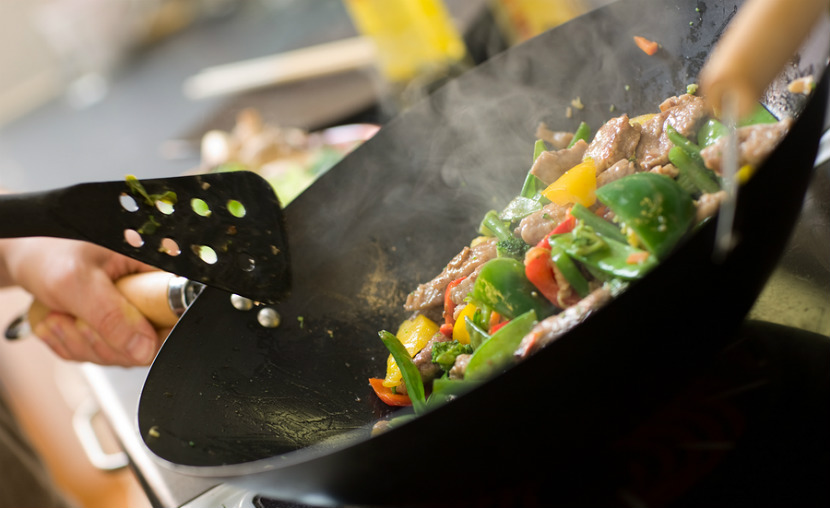Body for Life Beef Stirfry Nutrients

Cooking dinner at home has many advantages. When you prepare meals in your kitchen, you have the power to choose healthier recipes and ingredients. If you are looking for healthy and tasty dinner ideas, learn the simple art of stir-frying! Once you learn the basics, you can prepare an unlimited number of delicious dishes to make dinner exciting.
Stir it up!
Stir-frying is a fast way to cook small pieces of food in a hot pan or wok. As the name indicates, the food is constantly stirred while you cook it. You can prepare different vegetables, meats, seafood and poultry using this method.
In addition to being quick and easy, stir-frying is also healthy. It results in tender-crisp vegetables that retain more nutrients than if they were boiled. And since stir-frying requires only a small amount of oil, the fat content is low.
Use these five basic steps to create a healthy stir-fry:
1. Get the wok ready. An authentic stir-fry is made in a wok, which is a bowl-shaped pan. If you do not have a wok, you can use any large, shallow pan with a handle. You will also need a heat-resistant spatula or large spoon for stirring.
2. Choose an oil. Since a stir-fry is cooked at a high temperature, choose oil with a high smoke point. That means the oil will not emit smoke or unpleasant flavours. Oils with a high smoke point include:
- Safflower
- Corn
- Canola
- Soybean
- Sunflower
- Peanut
If you want to use olive oil, choose a refined olive oil (not extra virgin). Do not stir-fry in flax or hemp oil since they have very low smoke points.
You can also coat the wok with non-stick cooking spray instead of using oil. This method is used in Sweet chili tofu stir-fry.
3. Add protein. Once the oil is hot, add your favorite meat or alternative:
- Shrimp
- Lean beef
- Chicken breast or thigh
- Lean pork
- Salmon
- Tofu
The meat should be cut into thin strips so it cooks quickly and evenly. Once it's cooked, remove it from the heat. Use a thermometer to make sure your protein is cooked to a safe internal temperature.
4. Cook the vegetables. Add garlic to the hot wok. Once sizzling, add your favourite vegetables and cook until tender-crisp:
- Broccoli
- Cauliflower
- Carrots
- Celery
- Baby corn
- Mushrooms
- Eggplant
- Bell peppers
- Bok choy
5. Add flavour. Many stir-fry sauces are high in sodium.For example, many brands of soy sauce have around 1000 mg of sodium per tablespoon. A healthy diet should contain 1000-1500 mg of sodium per day and not exceed 2300 mg. Instead of a salty sauce, flavour your stir-fry with:
- Herbs: basil, oregano, cilantro
- Spices: cumin, coriander, cardamom
- Reduced sodium or no sodium added broth
- Fresh lemongrass, garlic or ginger
- 100% fruit juice
- Citrus zest
- Lower sodium soy sauces (<600 mg sodium per tablespoon)
Beware of reduced sodium sauces that say "25% less salt." They may still be high in sodium. For example, soy sauce with 25% less sodium still has 750 mg sodium per tablespoon! Replace half of the soy sauce in recipes with balsamic, rice or wine vinegar instead.
If you can't replicate the flavour of a high-sodium sauce in a certain dish, add a teaspoon or two at the end of cooking. This will give the dish more flavour compared to if you used several tablespoons added during cooking and the resulting dish will contain less sodium. Add fresh herbs just before serving to maximize their bold flavour.
Try any of these combinations to make a healthy and tasty stir fry:
| Dish | Protein | Vegetables | Flavour |
| Simple Shrimp and Broccoli Stir-fry | Shrimp | Broccoli | Garlic, reduced sodium broth, lemon zest |
| Sunset Orange-Ginger Pork | Pork tenderloin | Cauliflower, carrots, yellow peppers | Orange juice, orange zest, fresh ginger, reduced sodium broth |
| Thai Stir-fry | Chicken | Red peppers, eggplant, mushrooms, bean sprouts, bok choy | Lemongrass, lime leaves, garlic, sweet red chili sauce |
| Tofu and Chinese Greens | Tofu | Bok choy, broccoli, gailan | Sesame oil, sesame seeds, rice vinegar, reduced sodium broth, a teaspoon of oyster sauce |
| Spicy Beef Curry | Sirloin steak strips | Tomatoes, sweet peppers, hot peppers | Garam masala, cumin, fresh cilantro, ginger, lemon juice, yogurt |
To complete your meal, serve your stir-fry on top of brown rice, whole grain noodles or quinoa. Leftovers can be stored in the fridge and enjoyed as tomorrow's lunch.
Bottom line
Stir-frying is a healthy and quick cooking method with an endless variety of dishes. By following these five easy steps, you can enjoy a nutritious and delicious stir-fry for dinner tonight!
You may also be interested in
All About Dark Leafy Greens
How to Cook with Herbs
How to Cook with Spices
Reducing Sodium in the Kitchen
Last Update – September 16, 2019
Source: https://www.unlockfood.ca/en/Articles/Cooking-And-Food/Cooking-Methods/How-To-Make-A-Healthy-Stir-Fry.aspx
0 Response to "Body for Life Beef Stirfry Nutrients"
Post a Comment